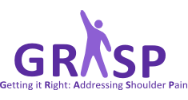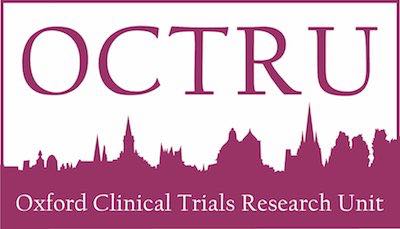If you are interested in becoming a study site then please contact us for more information.
For access to training videos please log in via the link below (for site staff only) :
Best Practice Advice training session
Progressive Exercise training session
Introduction
Shoulder pain is very common. Rotator cuff disorders are the most common type of shoulder pain, accounting for 70% of all new cases. Common treatments include advice, rest, painkillers, physiotherapy and steroid injections. Although used quite often, the effectiveness of physiotherapy is unclear. There is uncertainty about which techniques are most effective, how they should be delivered and whether an injection, in addition to exercise, may be of more benefit.
We have been commissioned by the NIHR Health Technology Assessment Programme to conduct a randomised trial that aims to give a definitive answer to find the best treatments for rotator cuff disorders.
The primary objectives of the GRASP trial are to assess whether:
-
An individually tailored progressive exercise programme supervised by a physiotherapist provides greater improvement in shoulder pain and function at 12 months compared to a best practice advice session with a physiotherapist, supported by high quality materials; and whether
-
Sub-acromial corticosteroid injection provides greater improvement in shoulder pain and function at 12 months compared to no injection.
We will conduct a within-trial economic analysis and estimate treatment effects in a range of secondary outcomes.
Study design and setting
This is a multicentre randomised controlled trial. We are recruiting 704 participants with a new episode of shoulder pain, attributable to a rotator cuff disorder, across at least eight musculoskeletal services and their related physiotherapy services in the UK.
Participant inclusion criteria
-
Aged 18 years and above.
-
New episode of shoulder pain attributable to a rotator cuff disorder (e.g. tendonitis, bursitis, impingement syndrome, tendinopathy or rotator cuff tear) diagnosed using criteria set out in the BESS guidelines.
-
Participant is willing and able to give informed consent for study participation.
-
Not currently receiving physiotherapy.
-
Not being considered for surgery.
Participant exclusion criteria
-
History of significant shoulder trauma (e.g. dislocation, fracture or full thickness tear requiring surgery).
-
Neurological disease affecting the shoulder.Other shoulder disorders (e.g. inflammatory arthritis, frozen shoulder, glenohumeral joint instability) or with red flags consistent with the criteria set out in the BESS guidelines.
-
Received corticosteroid injection or physiotherapy for shoulder pain in the last six months.
-
Contra-indications to corticosteroid injection.






